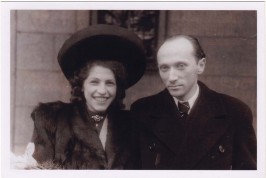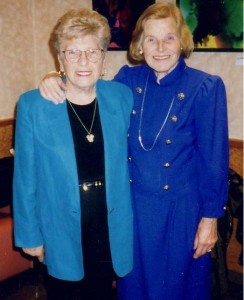Cases of rescuers from Berlin Paul and Helene Pissarius and Hannah Sotschek and her daughter Eva Cassirer, researched and documented by the IRWF, gain official recognition of YadVashem
Last month, two cases that were researched and documented by the IRWF, have gained the official recognition of Yad Vashem. The cases in question are those of rescuers from Berlin, Paul and Helene (Leni) Pissarius who for more than two years sheltered Ernst Joseph and his parents in their Berlin home; and that of Hannah Sotschek and her grown-up daughter Eva Cassirer who sheltered Mrs. Elisabeth Joseph (born Jacoby).
Having been familiar with our work, Mr. and Mrs. Joseph’s daughter had contacted us last year asking for help in honoring the rescuers who helped her mother and father live through the WWII in Berlin. Our team of researchers from Jerusalem and New York has been working on these cases, documenting facts and gathering testimonies. The key testimony was certainly that of Elisabeth Joseph who gave a first-hand account of her hiding in the Sotschek/Cassirer house and also confirmed the story of her then friend, Ernst Joseph, who became her husband after the war.
Elisabeth Joseph had a comfortable life living in Berlin with her parents, brother and their nanny. She was taking ballet classes and was dreaming of a career in dance. In 1937, when she was 14 years old, Hitler forbade Jews to attend any type of school and her formal education ended. Her family also had to move to a much smaller apartment as they were no longer allowed to live in their old neighborhood.
When an order on forced labor for Jews came Elisabeth and her brother were both summoned for work in the Siemens-Halske factory. One evening, they came back from work to found their apartment sealed by the Gestapo and a notice nailed at the door calling them to report to the detention center. They went into hiding, first in the home of their former nanny, and later, after her house was bombed, they started to move from one place to another, usually staying in the empty cellars and bombed houses. One day Elisabeth’s brother didn’t return to the hiding place and Elisabeth never found out what had happened to him, and never saw him again.
In the days that followed Elisabeth kept walking through Berlin during the day and spent nights sitting on a toilet seat at the Bahnhof-Zoo train station constantly in fear of being discovered. On one of her walks she heard someone calling her name. It was Eva Cassirer, a girl few years older than she was and whom she knew from school. Eva invited Elisabeth to come to her house that evening and hinted that her mother perhaps could help her. Ms. Sotschek, a wealthy and beautiful woman who knew that Elisabeth’s parents were taken away, agreed to help her without any hesitations. Elisabeth was given a new identity and lived openly as a maid in the house. Her new identity paper with the name of Liselotte Lehmann was provided by Eva through her friend from university.
Elisabeth lived in Sotschek’s house for more than two years. After the war she married Ernst Joseph who survived the war thanks to the help of other German family from Berlin.
Ernst Joseph was born on July 17, 1915. His family owned “Firma Lippman,”a small import-export business of canned goods that they were forced to liquidate after anti-Jewish laws came in effect.
From 1940 to 1941 he was forced to work on road construction and at the Siemens-Halske factory. Knowing that the Gestapo was taking people from their jobs and off the streets, Ernst searched for a hiding place large enough for him and his parents Leopold and Bertha. He took the recommendation of his business associate Oscar Materne to contact Paul and Leni Pissarius, who agreed to help him.
During the next two and a half years the Joseph family stayed hidden in the Pissarius house. While Ernst occasionally left to search for food and medicine on the black market, his parents Leopold and Bertha never left the apartment. Leopold had a history of medical problems and with the lack of medical care he died of a stroke in February of 1945. It was Paul Pissarius who helped Ernst Joseph placing the body of his father on a cart, and discharging it into the Spree River, in the middle of the night, not too far away from their house. When Berlin surrendered on May 2, 1945, Ernst and his mother had been in hiding at the Pissarius home for 27 months.


